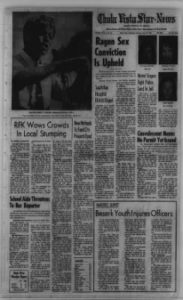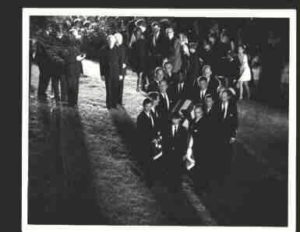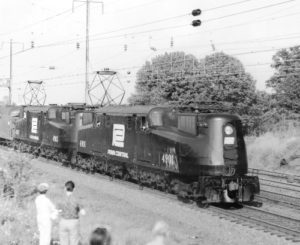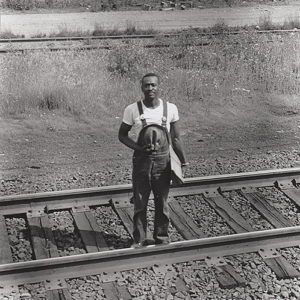6.6.68
I remember his white shirt. And his sleeves rolled up to his elbows. He was smiling. A big smile. I was looking up. My memory recalls a long platform, perhaps the back of a flatbed truck. And the people. So many people in the parking lot of the Chula Vista Public Library. I was 7. I was wearing a sundress and barefoot. And I remember that suddenly my mom seemed frightened. She didn’t think we were safe. She quickly picked me up and we were gone.
Days later I remember the television set on in our living room turned to a funeral, in black and white. I knew something very sad had happened. Our home was quiet, no one was talking. And my mom was very sad.
It wasn’t until older that I understood the funeral I watched on TV was for the same man I had seen in the parking lot of the our public library, days before he was murdered in Los Angeles, a nation trying to endure yet another assassination, urban violence, and the Viet Nam War. Sadness seemingly the new normal.
NPR
‘He is gone, yes — but nowhere near forgotten.’
Robert Kennedy wanted to know more about black America than briefings from the civil rights leadership could provide. So while he was attorney general and later, as a U.S. senator from New York, he made several trips to various parts of the country, urban and rural, to better understand race and poverty. Sometimes he took one of his older children with him.
Robert F. Kennedy Jr. still remembers one visit to Harlem: “At one point (we visited) a Puerto Rican mother in an apartment who kept cats in the apartment to keep rats from getting into the crib where they would bite her baby.”
The accompanying publicity moved the recalcitrant landlord to take care of the building’s vermin problem.
In his book American Values, Robert Kennedy Jr. noted his father also visited the Mississippi Delta and Appalachia, because he wanted Americans to know hunger was not just something they saw in Life magazine photo essays on developing nations.
“There were people — mainly in the Senate and the Congress — who said ‘starvation does not exist in America.’ ” The senator’s eyewitness accounts showed that was wishful thinking. Despite being one of the wealthiest countries on earth, the United States had a hunger problem it didn’t want to see.
During the late ’60s, California farmworkers, most of them Mexican-American, were struggling to bring attention to their abysmal working conditions. Life-long labor activist Dolores Huerta says Robert Kennedy made several visits to the striking farm workers she and Cesar Chavez were organizing in the fields of Delano, Calif.
“When the Senator came to Delano, it definitely put us on the national scene,” Huerta remembers. He came more than once. And he established a lasting friendship with Cesar Chavez, and was with Chavez when he ended a grueling 25-day water-only hunger strike.
“Chavez understood that this was one of the only white politicians — maybe the onlyone — who truly and instantaneously got what was going on with the farm workers,” says biographer Larry Tye.
Dolores Huerta believes that empathy and advocacy created an affection for the Kennedys — especially Robert — that has lasted for generations.
Washington Post/Chris Matthews
His contemporaries noticed the same thing. What made this Kennedy so unique, Jack Newfield wrote, “was that he felt the same empathy for white workingmen and women that he felt for blacks, Latinos and Native Americans. He thought of cops, waitresses, construction workers and firefighters as his people.”
We need leaders like him today, people who can unite diverse people into governing majorities.
RFK got a lot of attention recently for the speech he gave on April 4, 1968, the evening the Rev. Martin Luther King Jr. was killed.
Kennedy tried his best to hold it all together — if sometimes awkwardly.
“I have an association with those who are less well off, where perhaps we can accomplish something bringing the country back together,” he told a reporter just hours before he was killed. “If that division continues . . . we’re going to have nothing but chaos and havoc here in the United States.”
Late that summer, we saw what politics looked like with him gone. The Democratic National Convention in Chicago showed America at war with itself. It was the clash Bobby had wanted to prevent, between the police and the college kid, between the working guy and the better off, between father and son.
It’s been that way pretty much ever since.
As the country said goodbye to Bobby, on that grim June day when his funeral train rolled slowly from New York to Washington, thousands of African Americans gathered at 30th Street in Philadelphia and sang “The Battle Hymn of the Republic.”
But also along the tracks, between the cities, small poor white families stood in affectionate, patriotic salute. So did fathers and sons, including at least one pair of uniformed police officers.
I should end with a final bit of wisdom picked up from my Capitol cop days. It came from a fellow officer who commuted from West Virginia’s Eastern Panhandle. A real country boy, Leroy Taylor was full of attitude and hardscrabble wisdom. One day he took me, the college kid back from the Peace Corps, aside.
“You know why the little man loves his country?” he said. “Because it’s all he’s got!”
These days our politicians speak as if the interests of the discarded factory worker and the ignored inner-city youth cannot be met at the same time. Bobby Kennedy would have called that brand of politics “unacceptable.”
He saw the “little man” within all who struggled in our country. People sensed that about him and loved him for it. You saw the patriotic affection in the faces of those along the tracks that day he was carried to join his brother at Arlington.




Leave a Reply